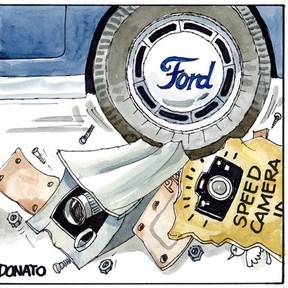Politics
Political Cartoons Spark Debate Over Freedom of Expression

Political cartoons by prominent artist Andy Donato have ignited a significant debate regarding freedom of expression in Canada following their publication on November 16, 2025. The cartoons, which satirize various political figures, have drawn both praise and criticism, prompting discussions in the Canadian Parliament about the boundaries of artistic expression in relation to political discourse.
The controversy began when Donato’s latest work, featuring caricatures of the Canadian Prime Minister and other prominent politicians, was shared widely on social media. Supporters argue that such cartoons play a vital role in democracy by challenging authority and encouraging public discourse. Critics, however, contend that some of the imagery crosses a line into offensive territory, raising questions about the responsibilities of artists in their portrayals of public figures.
Members of Parliament have weighed in on the matter, with some advocating for stronger protections for artistic expression while others call for accountability. The debate has resonated with citizens, many of whom have taken to social media to express their opinions on the matter.
Experts suggest that this incident highlights a broader issue regarding the balance between freedom of expression and respect for individuals in public life. Dr. Sarah Thompson, a professor of political science at the University of Toronto, stated, “Political cartoons have historically served as a mirror reflecting societal values and attitudes. They provoke thought and discussion, which is essential in a healthy democracy.”
The timing of this debate is particularly relevant given Canada’s robust discussions surrounding freedom of speech laws. As the country navigates its legal framework, the role of satire and its implications for public figures remain at the forefront.
In response to the backlash, Donato has defended his work, stating, “Art should challenge the status quo and spark conversation. If it makes people uncomfortable, that is often the point.” His remarks underscore the ongoing tension between artistic license and public sensitivity.
As the situation unfolds, it remains to be seen how this debate will influence policies regarding freedom of expression in Canada. With political cartoons serving as both a form of entertainment and a tool for critique, the discussions surrounding their impact on society are likely to continue.
This incident not only reflects the current political climate but also serves as a reminder of the integral role that humor and satire play in democratic societies.
-

 Politics1 week ago
Politics1 week agoSecwepemc First Nation Seeks Aboriginal Title Over Kamloops Area
-

 World4 months ago
World4 months agoScientists Unearth Ancient Antarctic Ice to Unlock Climate Secrets
-

 Entertainment4 months ago
Entertainment4 months agoTrump and McCormick to Announce $70 Billion Energy Investments
-

 Lifestyle4 months ago
Lifestyle4 months agoTransLink Launches Food Truck Program to Boost Revenue in Vancouver
-

 Science4 months ago
Science4 months agoFour Astronauts Return to Earth After International Space Station Mission
-

 Technology3 months ago
Technology3 months agoApple Notes Enhances Functionality with Markdown Support in macOS 26
-

 Top Stories1 month ago
Top Stories1 month agoUrgent Update: Fatal Crash on Highway 99 Claims Life of Pitt Meadows Man
-

 Sports4 months ago
Sports4 months agoSearch Underway for Missing Hunter Amid Hokkaido Bear Emergency
-

 Politics3 months ago
Politics3 months agoUkrainian Tennis Star Elina Svitolina Faces Death Threats Online
-

 Politics4 months ago
Politics4 months agoCarney Engages First Nations Leaders at Development Law Summit
-

 Technology4 months ago
Technology4 months agoFrosthaven Launches Early Access on July 31, 2025
-

 Top Stories3 weeks ago
Top Stories3 weeks agoFamily Remembers Beverley Rowbotham 25 Years After Murder



















